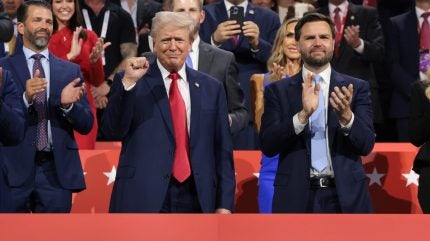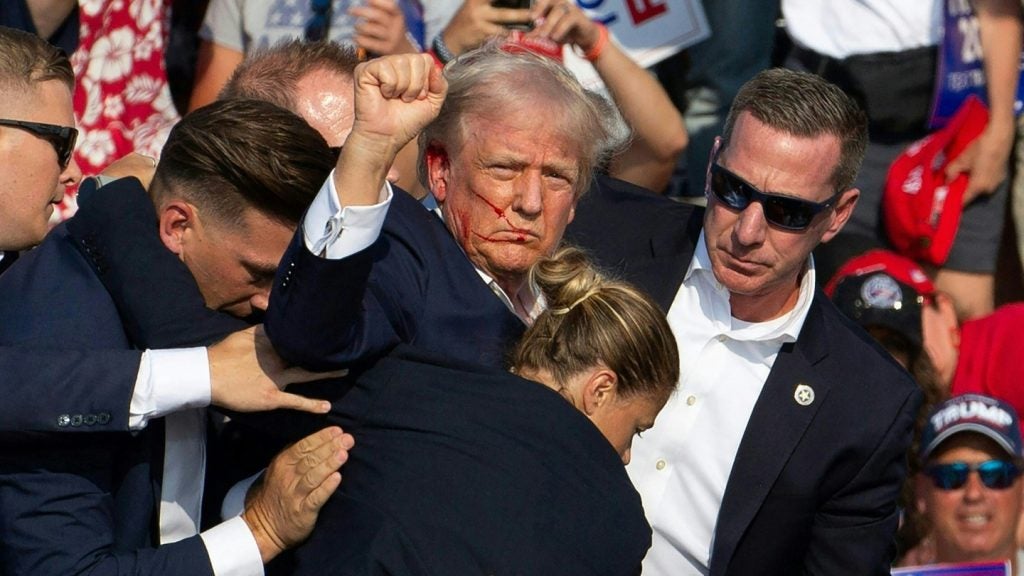
The MAGA movement just got its heir – and the Republican campaign an energetic, morally flexible populist set to amplify the Trumpian shockwaves that look increasingly likely to reverberate through the international order come November.
JD Vance’s unique ‘hillbilly’ narrative, service in the US Marines and forceful conservative ideology go hand-in-hand with Trump’s vision for the US over the next four, eight, or even 12 years.

Discover B2B Marketing That Performs
Combine business intelligence and editorial excellence to reach engaged professionals across 36 leading media platforms.
It is a vision built on a wave of isolationist thinking – ‘America First’ – which jeopardises the stability of global economic trade, transatlantic military alliances and Ukraine’s war effort.
Following several days of back-slapping at the Republican National Convention in Milwaukee, where Trump unveiled Vance as his running mate on Tuesday (16 July), attention has focused squarely on the ramifications of the duo’s more charged statements.
“I don’t really care what happens to Ukraine one way or another,” Trump’s Vice-President nominee said following Russia’s full-scale invasion of Ukraine in 2022. “The American security blanket has allowed European security to atrophy.”

US Tariffs are shifting - will you react or anticipate?
Don’t let policy changes catch you off guard. Stay proactive with real-time data and expert analysis.
By GlobalDataKyiv’s eyes remain wide, despite President Volodymyr Zelensky’s assurances that Ukraine will be able to work with whoever the next US President is.
Trump’s odds have risen significantly, helped by a rising aura of infallibility following his near-assassination last Saturday (13 July) and a litany of blunders by President Biden.
“Music to Putin’s ears”
Of Vance, Zelensky seems less certain.
Trump’s resolve against Zelensky’s appeals for Patriot air defence systems, Leopard tanks and ammunition will be reinforced by Vance’s unequivocal isolationist stance that the Russia-Ukraine conflict is not worthy of US dollars.
Herein lies Trump’s “transactional” approach to foreign policy, according to Gesine Weber, geostrategy analyst at the German Marshall Fund think tank.
“A second Trump term would be a geopolitical shock for Europeans, potentially more significant than the shock in 2016 because the threat environment in Europe has changed,” Weber tells Army Technology. “This is music to Putin’s ears.”
In February, Trump said he would “encourage” Russia “to do whatever the hell they want” to any Nato country that failed to spend enough on defence. Trump often hyperbolises his rhetoric, but to Nato members in eastern Europe where Putin’s shadow looms large, such statements are no joke.
Some have touted the proposed UK-EU security pact as a counterweight to potential US Nato absenteeism during Trump-Vance years.
Newly elected UK Prime Minister Keir Starmer has today (18 July) assembled more than 45 European leaders in Oxfordshire to discuss European security. Any such pact is highly unlikely to prevent Russia from seizing the Ukrainian lands it currently occupies – but it could stop Kyiv from falling.
EU moves towards defence autonomy
The only line a Trump-Vance presidency would not cross is an outright departure from Nato, Weber adds, even if only for self-serving reasons.
“Under a second Trump term, the US would potentially not withdraw from Nato because it is a tool for political pressure on the Europeans,” he says. “It is an excellent tool of leverage on allies.”
Trump’s isolationism aims to spur foreign spending on the US’ extensive defence industry, in which European powers are major buyers.
However, his proposed 10% blanket tariffs on foreign imports will “not impact the global defence industry in the way Trump expects”, according to Carolina Pinto, thematic analyst at GlobalData.
“Trump’s transactional approach may incentivise European governments to increase defence spending, but that defence spending may target domestic manufacturing and alternative suppliers to try to decrease Europe’s dependency on US defence and avoid inflated prices from US tariffs,” Pinto tells Army Technology.
The EU has responded promptly. Earlier today (18 July), European Commission President Ursula von der Leyen called for the formation of a European Defence Union – and the creation of a single market for defence across the continent’s member states.

Trump and Vince may be widely regarded as the pro-business ticket, but their policies have been criticised as counter-productive.
In an interview with Bloomberg on Tuesday (18 July), Trump framed the threat of hiking import tariffs as a response to the US’ trading partners keeping their currencies ‘too low’ – competitive, in other words – compared to the dollar.
“Were Trump to carry out that threat, the result would be counter-productive: higher US inflation and interest rates further strengthening the dollar, because higher rates make it (even) more attractive to hold dollars,” says Christopher Granville, managing director of global political research at TS Lombard.
Vance has campaigned heavily on his ‘hillbilly’ background. Like Trump, he claims to champion the working-class Americans whose living costs are set to rise, a reflection of Vance’s political and moral flexibility, now running for office alongside the man he once called “America’s Hitler”.
A ‘pivot to China’?
Trump and Vance’s intention is to promote domestic manufacturing, particularly against the influx of cheaper Chinese imports.
In May, Biden raised the tariffs on Chinese EVs from 25% to 100%. Trump has promised to place a 60% tariff on all Chinese imports, not just in the auto industry.
But the transition to domestic-dominated manufacturing “will not be seamless”, Pinto adds, and “domestic manufacturers will continue (at least to some extent) relying on foreign suppliers”.
“A 10% global tariff, alongside Trump’s threat to impose a 60% tariff on Chinese imports, will have significant inflationary consequences for the US economy and require government spending to subsidise the financial impact,” Pinto tells Army Technology. “Some US allies will be able to circumvent these tariffs through bilateral free trade agreements.”
This comes as part of Trump’s so-called ‘pivot to China’ – a rechannelling of the US’ geopolitical and economic firepower towards Beijing, which many in Washington perceive as a bigger threat than Putin’s Russia.
Trump has asserted that “Taiwan should pay us for defence”, arguing that the US acts as Taiwan’s “insurance” when “they did take about 100% of our chip business”.
It has wreaked havoc on the stocks of Taiwan Semiconductor Manufacturing (TSMC), the world’s largest contract chipmaker, which fell by 7% yesterday (17 July) and a further 2.4% today (18 July).
The single-mindedness behind Trump’s statement has quickly become apparent. Major Western tech companies and chip designers including Nvidia and AMD rely heavily on TSMC, while Apple alone accounts for 25% of its revenue.
Disrupting relations with TSMC “would have severe repercussions for the US tech industry, particularly given the lack of immediate alternatives”, according to Isabel Al-Dhahir, principal thematic analyst at GlobalData.
“Intel, the only advanced chip maker in the US, has been lagging behind TSMC after it failed to invest in cutting-edge technologies at critical moments. Trump’s comments are short-sighted as he panders to the populist vote, neglecting the long-term strategic advantage of maintaining strong ties with Taiwan”, Al-Dhahir says.
“By exposing Taiwan to potential Chinese retaliation and jeopardising its high-end semiconductor market, the US would not be doing its heavily dependent players any favours, and many of them have already criticised the sanctions on US trade with China.”
Should the Democrats fail to replace an increasingly feeble and unpopular President Biden, Trump and Vance’s path to the White House looks more probable by the day. Their isolationist words may contain more bark than bite, but, likewise, November’s elections may bring a seismic shift in the global geopolitical and economic order.





